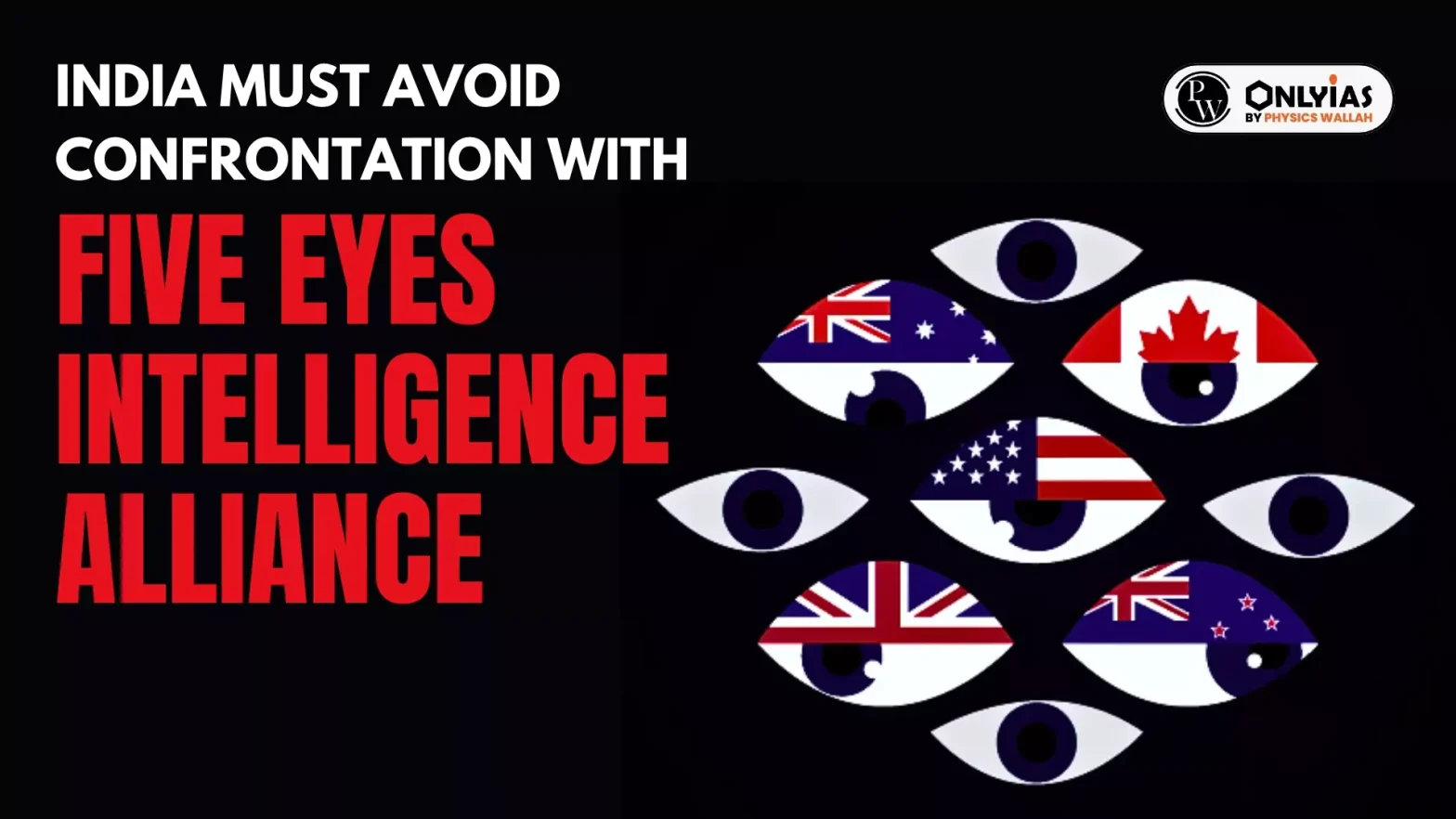Context
Recent reports of alleged activities of Indian Intelligence Agencies, notably the Research and Analysis Wing in countries as far away as Canada, the United States and Australia have brought to the fore the contentious issue of intelligence operations.
Navigating Five Eyes Intelligence Alliance and India’s Intelligence Landscape
Five Eyes Intelligence Alliance comprises of the United States, the United Kingdom, Canada, New Zealand and Australia.
- India’s Intelligence Challenge: As India navigates its role in the global intelligence landscape, it faces a myriad of converging and diverging interests with Five Eyes.
- India’s Intelligence Ties: There is a need to analyze the dynamics of India’s relationship with the group, exploring areas of convergence and divergence in intelligence cooperation.
Enroll now for UPSC Online Course
Areas of Convergence
- Counterterrorism: One of the areas of convergence between India and the Five Eyes countries is counterterrorism.
- Intelligence sharing regarding terrorist activities, networks, and potential threats is crucial for pre-emptive measures and joint operations.
- India’s geographical location and historical experiences with terrorism make it a valuable partner in the Five Eyes’ efforts to combat extremist organisations.
- Cyber security: In an increasingly digitised world, cybersecurity has emerged as a paramount concern for nations worldwide.
- India and the Five Eyes countries recognise the importance of information security and collaborating on cyber threat intelligence sharing, technological advancements, and joint exercises.
- Given India’s burgeoning IT sector and expertise in cybersecurity, this collaboration will only enhance the capabilities of the Five Eyes alliance in combating cyber threats.
- Maritime security: With a vast coastline and strategic maritime interests, India shares common concerns with the Five Eyes nations regarding maritime security and safeguarding vulnerable sea lanes of communication.
- Cooperation in maritime domain awareness, naval exercises, and anti-piracy operations strengthens the collective ability to safeguard vital sea lanes and maritime interests.
Areas of Divergence
- Strategic autonomy: One of the pillars of India’s foreign policy doctrine emphasises strategic autonomy and non-alignment, which often conflicts with the objectives of the Five Eyes alliance.
- While India seeks to maintain friendly relations with all nations, including those outside the Five Eyes, its approach is often divergent from the alliance’s unified stance on certain geopolitical issues.
- Regional dynamics: India’s complex relationships within its immediate neighbourhood, particularly with countries like China and Pakistan, can create divergent interests with the Five Eyes alliance.
- While the alliance may prioritise containing perceived adversaries, India’s approach to regional diplomacy often involves nuanced engagement and balancing acts to safeguard its interests without escalating tensions.
- Data privacy and sovereignty: India’s stance on data privacy and digital sovereignty may differ from the policies advocated by the Five Eyes countries.
- India’s regulatory frameworks, such as data localisation laws and restrictions on foreign technology companies, may clash with the alliance’s push for open data flows and liberal market access.
Avoiding Confrontation
Enhanced security cooperation: By avoiding confrontation, both India and the Five Eyes alliance can focus on enhancing security cooperation in areas of mutual interest as outlined above, such as counterterrorism, cybersecurity, and maritime security.
- Confrontation could undermine trust and hamper collaboration, weakening collective efforts to address common threats, putting the world at risk.
Enroll now for UPSC Online Classes
Conclusion
Avoiding confrontation between India and the Five Eyes alliance is essential for fostering security, stability, and cooperation in an increasingly complex global environment. By focusing on areas of convergence and managing differences constructively, they can better address common challenges and seize opportunities for mutual benefit.
Also Read: Cyber Frauds And Crimes In India
![]() 14 May 2024
14 May 2024
